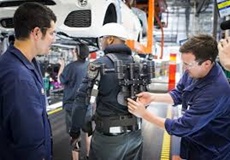Ford testing exoskeleton designed to ease physical tasks for workers
10 Nov 2017
Ford is testing a new exoskeleton designed to make physical tasks easier for the human half of the man-machine combination.
 The so called EksoVest, the wearable technology elevates and supports a worker's arms while performing overhead tasks.
The so called EksoVest, the wearable technology elevates and supports a worker's arms while performing overhead tasks.
The technology was developed by California's Ekso Bionics, in a former Ford factory in Richmond. The device, which weighs 9.5 pounds straps onto the shoulders and arms of a worker and uses unpowered springs to give them a little super strength.
The vest adds an extra five to 15 pounds of lifting effort, which can be helpful for lifting heavy objects, but in this case is being mainly tested during tasks requiring employees to raise their arms overhead to work on the underside of vehicles suspended from above.
According to Ford a number of assembly line workers have to perform such tasks over 1 million times a year, and it is looking to see if the EksoVest reduces fatigue and injuries. It is currently undergoing trials at two plants in Michigan, with tests at other locations to follow in the coming months.
In addition to the EksoVest, Exso Bionics has also developed a full-body powered exoskeleton for patients recovering from spinal cord injuries and strokes.
The four EksoVests under trial have been paid for by the United Auto Workers union, which represents hourly workers at Ford. The automaker plans to test the exoskeleton in other regions including Europe and South America. The cost of the exoskeletons, developed in partnership between Ford and Ekso, has not been disclosed.
Ekso started off developing exoskeletons for the military and medical fields, but branched out in manufacturing and construction in 2013.
According to Russ Angold, Ekso's chief technology officer, the aim is to get workers used to the technology before moving eventually into ''powered'' exoskeletons that ''will help with lift and carry'' work.
''The idea is to demonstrate this isn't science fiction, it's real and it has real value,'' Reuters quoted Angold yesterday. ''As we prove its value, we will be able to expand into other tasks.''


















